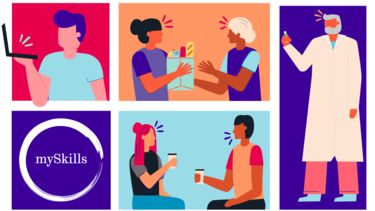How to proofread your work
You likely feel a huge relief when you complete a tough assignment, and just want it submitted and out of the way. However, taking a break from your assignment and then proofreading it - following the guidance on this page - will ensure that you minimise the risk of errors and mistakes.
What is proofreading?
Proofreading, the process of checking text for errors and mistakes, is a vital and often overlooked academic skill that can improve the quality of your written work at university and beyond. Proofreading commonly concentrates on aspects of writing such as grammar, spelling and punctuation, but more in-depth proofreading might also pick out questions of style, clarity and structure.
In much academic work, you will also need to check the presentation of numbers, referencing and the overall formatting of the work. Download our handy checklist (PDF, 570KB) for your assessed work.
But there is more to proofreading than just checking your work. The guidance below will introduce you to some of the main things to watch out for when you are proofreading and some useful strategies to make sure that you are getting the most out of your proofreading and producing polished written work free from avoidable errors.
Editing and Proofreading workshopThis workshop will share a number of key editing and proofreading techniques and give you the skills you need to improve the quality of your own written work.
The importance of proofreading
Proofreading is important in all writing because it's frequently the small details that matter. You don't want your reader – whether that's a lecturer, a potential employer or anyone else – to be distracted by errors on the surface of your text. You want them to engage with all the good things you have to say.
Proofreading, however, can be deceptively tricky. It's a real challenge to find grammatical or spelling errors in text, especially in writing with which you’re very familiar – your eye and your brain know what they expect to find, so they don't pay close attention to what is actually there.
This is why it can help to leave written work for a day or two before proofreading it; reading your work aloud or even reading pages from the bottom up to keep your concentration sharp.
Getting to grips with grammar
If grammar is an issue and you would like some further training and guidance, check out the English Language Teaching Centre (ELTC) online grammar bank.
It provides interactive online training in the use of academic grammar with a series of short activities that you can apply to your academic writing.
Using paid proofreading services
There are a large number of companies offering paid proofreading services to students.
Be aware that the University of Sheffield does not endorse any of these services. If you use them, you do so at your own risk.
All writing submitted for assessment must be your own work, so any external input into your writing carries with it a risk of plagiarism.
Proofreading your own work is free, carries no risk of plagiarism and will teach you a new transferable skill.
For more information on plagiarism, collusion and unfair means, see our guidance for students on unfair means.
Proofreading top tips
- Don’t proofread until you're completely finished with the actual writing and editing.
- It may be easier to spot mistakes if you proofread from a paper printout of your text rather than from a screen version.
- Make sure you have no distractions or potential interruptions.
- Forget the content or story and focus on each paragraph or section. One way to do this is to begin proofreading from your last paragraph to your first paragraph. If you read in the order that you have written the text, the brain is lulled into a false sense of security and it is easy to miss errors. Reading in reverse helps concentration and noticing.
- Make several passes for different types of errors, e.g. check for correct referencing throughout the whole document, then check for grammar, punctuation and spelling, then check layout and structure
- If you do make a last-minute change to a few words, make sure you check the entire sentence, or even paragraph, over again.
- Check facts, dates, quotes, tables, references, text boxes, and anything repetitive or outside of the main text separately.
- Get familiar with your frequent mistakes.
- Check the format last.
Next steps
Further Resources
- Open University – Editing and checking
- BBC – Editing and proofreading

mySkills
Use your mySkills portfolio to discover your skillset, reflect on your development, and record your progress.
